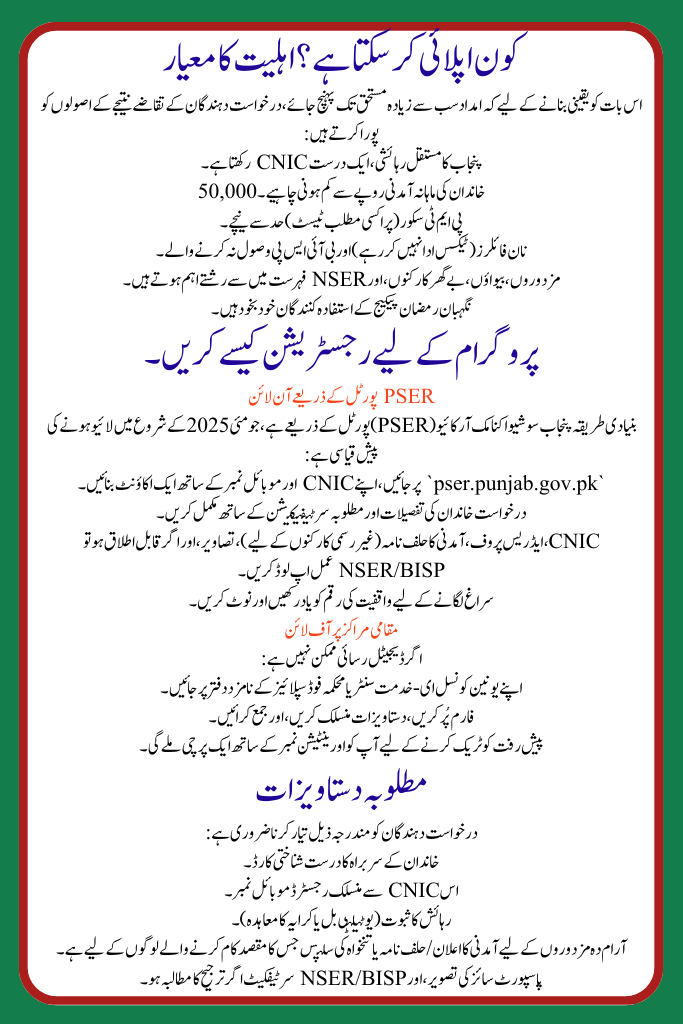Punjab Ration Card Program 2025
The Punjab Ration Card Program 2025 is a major welfare ingenuity presented by Chief Minister Maryam Nawaz to ease food safety and poverty among low-income relatives in Punjab. Below this scheme, each eligible domestic receives Rs. 3,000 every month, delivered through a secure digital smart card. Launched on April 29, 2025, this package targets 1.2 to 1.25 million worthy relations and aims to provide fast, transparent, and fair assistance across both rural and urban areas of the area.
More Read: Step-by-Step BISP 8171 Verification August 2025
Quick Information Table
| Field | Details
Program Name | Punjab Ration Card Program 2025
Application Start | April 29, 2025
Application End | Rolling / Ongoing
Managing Authority | Punjab Govt via PSER Portal
Total Amount | Rs. 3,000 per month per family
Benefit Duration | Monthly until program continuation
Initial Cities | Bahawalpur, Muzaffargarh, Jhang, DG Khan, Rawalpindi, Kasur, Lahore
Province | Punjab, Pakistan
Application Method | Online via PSER or Offline at centers
What Is the Punjab Ration Card Program 2025?
This program is Punjab’s most significant welfare drive, present a Rs. 3,000 monthly ration subsidy to vulnerable families. Starting a phased rollout in major districts, the program is expected to cover the entire province within five to six months.
It employs a digital smart card which links to the CNIC and PSER database, ensuring transparency and eliminating fraud. With participation from the Labour Department, Bank of Punjab, and PITB, the delivery system is robust and closely monitored.
Key Benefits for Beneficiaries
- Regular Monthly Aid – Every approved family receives Rs. 3,000 monthly, starting June 1, 2025.
- Discounted Essentials – Subsidized staples like flour, sugar, rice, and pulses are obtainable at 20% off from recorded stores.
- Convenient Access– Cards are putative at utility stores then approved kiryana shops across Punjab.
- Digital Safety – Dealings are traceable, and fraud is reduced using the smart postcard system.
More Read: 8171 Ehsaas Program August 2025
Who Can Apply? Eligibility Criteria
To ensure the aid reaches the most deserving, applicants requirement meet the resulting norms:
Permanent resident of Punjab, holding a valid CNIC.
Monthly family income must be under **Rs. 50,000.
PMT score (Proxy Means Test) below threshold.
Non-filers (not paying taxes) and non-receivers of BISP.
Laborers, widows, dispossessed workers, and relations from the NSER list get importance.
Beneficiaries of the Nigehban Ramzan Package** are auto-enrolled.
How to Register for the Program
Online via PSER Portal
The primary method is through the **Punjab Socio-Economic Archive (PSER) portal**, predictable to go live in initial May 2025:
Visit `pser.punjab.gov.pk`, create an account with your CNIC and mobile number.
Complete the application with family details and required certification.
Upload CNIC, address proof, income affidavit (for informal workers), photographs, and NSER/BISP process if applicable.
Succumb and note the orientation amount for tracking.
Offline at Local Centers
If digital access is not possible:
Visit your Union Council e-Khidmat Center or designated Food Supplies Department office.
Fill out the form, attach documents, and submit.
You’ll receive a slip with a orientation number to track progress.
More Read: BISP 8171 New Payment Method August 2025
Required Documents
Applicants must prepare the following:
Valid CNIC of the family head.
Registered mobile number linked to that CNIC.
Residence proof (utility bill or rent agreement).
Income declaration/affidavit for relaxed labors or pay slips aimed at working people.
Passport-size photo, and NSER/BISP certificate if demanding priority.
Application Timeline and Status Tracking
Launch Date: April 29, 2025.
Rollout Start: Payments to begin from June 1, 2025
Initial Rollout Areas: Bahawalpur, Muzaffargarh, Jhang, Dera Ghazi Khan, Rawalpindi, Kasur, Lahore.
Full Province Rollout: Within five to six months.
Monitoring: Daily oversight by Labour Department and partners.
. You can also use SMS 8123 if available.
How the Ration Card Works
Once approved, beneficiaries receive a digital smart card linked to CNIC. Usage process:
Visit an authorized utility or partnered shop.
Swipe the card and complete biometric verification.
Get up to Rs. 3,000 of subsidized groceries like flour, sugar, rice, pulses.
The system ensures convenience, safety, and accountability in transactions.
More Read: CM Punjab Laptop Scheme 2025
Program Impact and Government Safeguards
This initiative is the largest welfare program in the history of Punjab. It supports laborers and vulnerable families with monthly cash and discounted groceries.
To ensure fairness:
The program uses a central database** to prevent duplicate listings.
Monitoring teams oversee daily operations to avoid deductions or fraud.
Other support programs — like healthcare upgrades and daycare facilitation — run in parallel to improve overall welfare.
Common Questions (FAQ)
Is this scheme only for Punjab residents?
Yes, only permanent inhabitants of Punjab are qualified.
Can multiple family members apply?
No. Only one member per family can apply.
Are there any charges to apply?
No. The application process is free over official channels only. Beware of scammers.
Can BISP beneficiaries apply?
No, families already receiving BISP provision are not eligible.
What if someone already got Nigehban package?
They are auto-registered. No need to reapply but must verify status.
Conclusion
In this article, we have communal all the details around the Punjab Ration Card Program 2025, counting its launch, benefits, eligibility, registration process, required documents, usage, and protections. This program delivers Rs. 3,000 monthly aid through a digital smart card to over a million deserving families across Punjab, preliminary from June 1, 2025. Whether you’re in a city or a village, the portal and local centers make registration accessible. With slide, technology, and careful mistake, the management is ensuring every rupee grasps the right people.
